NEWSMAKER INTERVIEW:
Lithuania would welcome a more permanent U.S. troop presence within its borders to deter increasingly brazen Russian provocations, the Baltic nation’s defense chief said Thursday, stressing that Lithuanian forces are committed to backing American-led missions in Iraq and Afghanistan but need as much U.S. help as they can get at home.
Arguing that the U.S. and other NATO allies must beef up their military might in the Baltic states as a counterweight to Moscow, Lithuanian Defense Minister Raimundas Karoblis said he also supports Poland’s offer to pay up to $2 billion for the potential construction of an American base there. The Pentagon has remained quiet about such an offer.
In a wide-ranging interview with The Washington Times, Mr. Karoblis said President Trump is right to pressure NATO members — Germany in particular — to increase military spending and warned that Russian disinformation operations have grown “more sophisticated” since the 2016 U.S. election season.
While he was careful in his comments about Mr. Trump and Russia, the defense minister rejected the argument that Mr. Trump had been too soft on Russia and President Vladimir Putin. If anything, Mr. Karoblis said, Mr. Trump is navigating a turbulent and complicated relationship with a U.S. Cold War-era foe, which is probing continually along the border with front-line NATO states and U.S. allies from the Balkans to the Baltics.
Mr. Karoblis said the offer last month by Lithuania’s neighbor Poland to pay for a permanent U.S. base underscores just how seriously regional powers take the Russian threat after Moscow’s annexation of Ukraine’s Crimean Peninsula in 2014. Fears are swirling across the region that the Kremlin is looking to pressure or woo countries on its border while sowing divisions within the European Union and NATO.
On the security front, Mr. Karoblis said even a “limited presence of American troops in the Baltic countries” could be sufficient to deter Mr. Putin. Although it would surely draw condemnation from Russia, he said, the deployment would be worth it.
“We would like it. It would be better from a deterrence point of view,” he said, repeating calls from Lithuanian President Dalia Grybauskaite, who also has been a vocal proponent of more U.S. troops in her country.
“At least we need the discussion of U.S. presence in the region,” said Mr. Karoblis, adding that he believes the Trump administration is “behind us and supporting us.”
The U.S. had about 140 troops permanently stationed in the country until they began rotating assignments throughout the broader Baltic region last year.
The American military presence in the area is still robust. The U.S. Army, for example, held military drills this month in Lithuania as part of its yearly Saber Strike 18 exercises. The drills also included other NATO allies.
Mr. Karoblis said Lithuania isn’t necessarily asking for the same type of full American military base that Poland wants, but he thinks greater cooperation on air defense, or joint military exercises, would send a strong signal to the Kremlin. Lithuania joined NATO in 2004.
While careful to not offer a quid pro quo, he said Lithuania will be willing to send more troops to Afghanistan to aid the U.S. with training exercises and other missions. Lithuania currently has about 100 troops in Afghanistan.
“Definitely, we would increase our participation,” Mr. Karoblis said.
The Russian threat
On broader relations with Russia, the defense minister cautioned Mr. Trump, French President Emmanuel Macron and others about negotiating with Mr. Putin. He said Lithuania is uncomfortable with the prospect of Mr. Trump and Mr. Putin meeting face to face.
“We don’t like this idea,” he said. “We are afraid Putin could use it for his own purposes and that the winner would not be President Trump, but Putin.”
Mr. Karoblis was perhaps most passionate about Russian propaganda efforts, or “fake news” initiatives, which he said are more dangerous than ever and have even affected him personally.
“These attempts — they are becoming more sophisticated,” he said, recounting a recent incident in which Russian hackers apparently took control of a Lithuanian news site and spread false rumors that he is gay and had been accused of sexual harassment.
“It’s about my privacy. It’s about my family,” he said of the false stories, which were ultimately taken down and debunked.
The incident, Mr. Karoblis said, highlights how Russia has moved beyond its more traditional method of spreading falsehoods via social media. Russian hackers reportedly hacked into the website of the Lithuanian television channel TV3 this year and then disseminated the information.
In addition, he said, hackers reportedly sent emails loaded with viruses and spyware to Lithuanian officials. In 2016 alone, the Lithuanian government sustained at least 20 email attacks, and the incidents continued.
Mr. Karoblis heatedly denounced another false story, apparently circulated by Russian operatives, that a U.S. military vehicle had killed a child during the recent military drills in Lithuania. The story seemed to have gained some traction on social media before it was debunked.
“Their main aim is to discredit” U.S. troops, he said.
More broadly on NATO, Mr. Karoblis reiterated one of Mr. Trump’s top talking points on the alliance: that member countries need to spend more on defense.
“President Trump is right,” he said. “The question is about Germany, first of all.”
The Trump administration has called on all NATO members to meet a pledge to spend at least 2 percent of their gross domestic product on defense by 2024, a figure that Mr. Karoblis said his nation is now meeting.
German defense spending as a percentage of overall output over the past 15 years has averaged far less than 2 percent, NATO figures show.
• Ben Wolfgang can be reached at bwolfgang@washingtontimes.com.




Please read our comment policy before commenting.